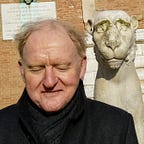Universal Soldier
Can you imagine a world without soldiers?
In his book, American Crucible, historian Gary Gerstle reflects on the role of war in the evolution of twentieth-century America in terms of race and nation. His challenging premise is that war is not the exception; peace is. Typically, war has both advanced and retarded race relations in the United States by boosting both a civic nationalism that espouses equality and justice and a racial nationalism that is rooted in white supremacy. The War on Terror, for instance, has added fuel to the idea that not everyone is rightfully American. To quote Dr. King: The bombs we drop… explode at home.
Looking back over my life, I realise how lucky I’ve been to be born in England in the second half of the twentieth century. My grandfather and father served in World Wars I and II, and I believed it marked them, like most of their contemporaries. They never fully recovered from being a soldier.
Somewhere, I have a fading sepia photo of my grandfather in uniform. Before going to war in Flanders, he had never left his hometown. When he came back, he was similarly unadventurous, preferring to spend time in his cobbler’s shop talking and…
